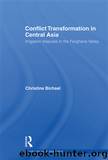Irrigation Disputes in the Ferghana Valley by Christine Bichsel

Author:Christine Bichsel [Bichsel, Christine]
Language: eng
Format: epub
Tags: Water-Supply, Fergana Valley - Ethnic Relations - Economic Aspects, Water Resources Development, Water Resources Development - Political Aspects - Fergana Valley, Fergana Valley - Ethnic Relations - Political Aspects, Fergana Valley, Real Estate, Conflict Management, Water Supply, Peace-Building, Peace-Building - Fergana Valley, Interpersonal Relations, Conflict Management - Fergana Valley, Water Supply - Political Aspects - Fergana Valley, Political Science, Water-Supply - Political Aspects - Fergana Valley, Political Aspects, General, Business & Economics, Psychology
ISBN: 9780415467254
Google: sjm3FFNtqEgC
Amazon: 041562004X
Publisher: Routledge
Published: 2009-01-11T18:30:00+00:00
6 The crucible of harmony
Violence and politics
This chapter focuses on an escalation of a conflict in an irrigation system in 2005 and the political interdependencies which came into view with the escalation.1 At the same time, it explores the element ofjoint social activities in the aid agencies’ approach. In this chapter, I provide insights into how a particular escalation unfolds, and into the political processes and power relations which shape it. At the same time, I direct attention to the ways in which the escalation is represented.
‘Urgent! We have a conflict!’
All three aid agencies foresee conflict analyses for their activities. These analyses constitute an important source of information for the three aid agencies whose representatives have few if any access to other data and visit the project sites irregularly. In particular for UNDP and SDC, conflict analyses in the form of written reports on specific conflicts are produced prior to most activities. After inception of activities, further reports are produced to monitor the situation in the project area. Next I will look into the nature and scope of such conflict analyses and related reports in the aid agencies’ framework. For this purpose, I trace how knowledge on a specific escalation between Khush'iar, Sogment and Charbak (see Chapter 2) in May 2005 was established. Based on the reports written by the three NGOs, FTI, Mehr and Yutymak, I begin with establishing the chronological sequence of the escalation.
On 1 May 2005 an incident between Khush'iar villagers from Uzbekistan herding cattle on Kyrgyzstan’s territory and patrolling Kyrgyzstani border troops left the former injured and in need of hospitalisation. As the news spread in Khush'iar, relatives of the injured and other villagers went to the Kyrgyzstani border post and demanded an explanation of the incident. The commander assured them that the incident would be investigated (Mehr 2005a).2 On 3 May, during the weekly market in Charbak, villagers from Khush'iar blocked the exit and thus prevented traders and buyers from Sogment, Charbak and other villages in Kyrgyzstan from leaving the market. In the course of the events, Kyrgyzstani villagers were injured, some of them subsequently hospitalised, and cars damaged (Mehr 2005a, Yntymak 2005b). Towards the evening, both the deputy governor of Batken province and the head of the district administration (khokim) of Sokh district arrived in Charbak, as did reinforcement of police and border troops during the day. Eventually, the traders and the Sogment and Gaz villagers were escorted back to Sogment jointly by Kyrgyzstan’s and Uzbekistan’s armed troops (Yntymak 2005b). During this day, sections of the Sogment-Charbak pipeline financed by Mercy Corps were allegedly destroyed.
On 4 May 2005, from early morning on 250-300 villagers from Sogment and Gaz gathered on the upper side of the Baiaman bridge (Yntymak 2005a) which marks the de facto border between Kyrgyzstan and Uzbekistan, while more than 500-600 people from Khush'iar gathered on the lower side of the bridge (Mehr 2005a). The atmosphere was described as very tense, and soldiers on both sides restrained people from moving closer towards the bridge.
Download
This site does not store any files on its server. We only index and link to content provided by other sites. Please contact the content providers to delete copyright contents if any and email us, we'll remove relevant links or contents immediately.
| Anthropology | Archaeology |
| Philosophy | Politics & Government |
| Social Sciences | Sociology |
| Women's Studies |
The Secret History by Donna Tartt(19048)
The Social Justice Warrior Handbook by Lisa De Pasquale(12187)
Thirteen Reasons Why by Jay Asher(8893)
This Is How You Lose Her by Junot Diaz(6877)
Weapons of Math Destruction by Cathy O'Neil(6264)
Zero to One by Peter Thiel(5786)
Beartown by Fredrik Backman(5737)
The Myth of the Strong Leader by Archie Brown(5498)
The Fire Next Time by James Baldwin(5431)
How Democracies Die by Steven Levitsky & Daniel Ziblatt(5213)
Promise Me, Dad by Joe Biden(5141)
Stone's Rules by Roger Stone(5081)
A Higher Loyalty: Truth, Lies, and Leadership by James Comey(4951)
100 Deadly Skills by Clint Emerson(4920)
Rise and Kill First by Ronen Bergman(4779)
Secrecy World by Jake Bernstein(4740)
The David Icke Guide to the Global Conspiracy (and how to end it) by David Icke(4701)
The Farm by Tom Rob Smith(4502)
The Doomsday Machine by Daniel Ellsberg(4484)
